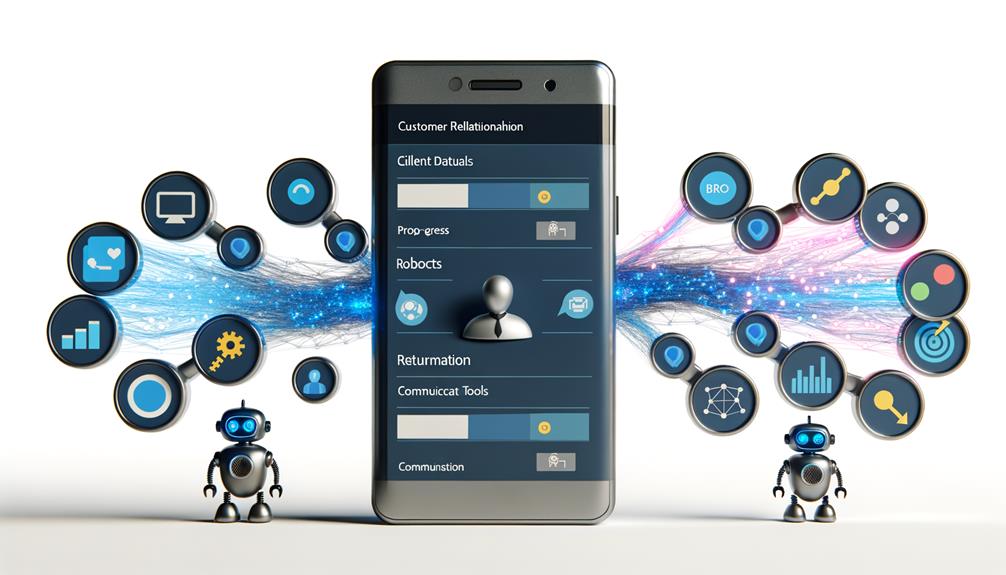Integrating AI with your existing CRM system can transform your business. It optimizes processes, making use of machine learning and algorithms to better understand customer interactions. This integration can enhance sales prediction, streamline marketing strategies, and personalize your users' experiences. However, it's important to manage customer data effectively, understand the technical demands, and adhere closely to sales processes for a seamless integration. The right AI-enabled CRM could be a game-changer for your business. Several options exist from Salesforce Einstein to HubSpot's ChatSpot. Each offer unique features to enhance operational efficiency. Dig deeper and you'll find out which one aligns best with your business needs.
Understanding AI and CRM Integration

To fully grasp the dynamics of AI-CRM integration, you'll need to navigate the intricate landscape of customer interactions enhanced by advanced algorithms and machine learning. This integration optimizes these interactions, making your CRM processes more efficient. However, it's not without its challenges. Given the unique nature of CRM processes, there are certain complexities involved in this integration, eleven specific ones to be exact. Understanding both the organizational and managerial elements at play is essential. Additionally, data analysis plays a significant role in facilitating the successful integration of AI with CRM. To address these obstacles, specific guidelines have been developed. By adhering to them, you'll be better equipped to leverage AI in your CRM systems effectively, paving the way for improved customer relationships.
Benefits of AI in CRM Systems

You're about to see how AI can revolutionize CRM systems. Imagine boosting your sales forecasts accuracy, streamlining your marketing strategies, and providing a personalized user experience, all through AI integration. This isn't merely theoretical – businesses are already experiencing these benefits today.
Enhancing Sales Prediction
In harnessing the power of AI in CRM systems, your sales prediction accuracy can greatly improve, thanks to the analysis of historical data and customer behavior patterns. The insights garnered from this analysis offer a clear vision of future sales trends, aiding your decision-making process. Moreover, your sales teams can forecast sales more effectively, optimizing strategies and resource allocation.
| Benefits | AI in CRM Systems | Sales Prediction |
|---|---|---|
| 1. Enhanced Accuracy | Through historical data analysis | Improved sales forecasting |
| 2. Effective Decision-making | Providing insights into sales trends | Aid in strategy formulation |
| 3. Resource Optimization | Through effective sales forecasting | Better allocation of resources |
Streamlining Marketing Strategies
Moving beyond sales predictions, let's consider how AI integrated with CRM systems can help streamline your marketing strategies. By harnessing AI in CRM, you can enhance the precision of customer segmentation, thereby targeting your marketing campaigns more effectively. AI's ability to analyze customer interactions provides a better understanding of your audience's preferences and behaviors. This refined customer data can greatly improve the personalization of your sales approach. More so, the actionable insights derived from CRM systems equipped with AI empower you to make informed decisions in your marketing endeavors. This integration not only streamlines your workflows but also accelerates the reporting of insights, thereby boosting your marketing efficiency. Ultimately, AI in CRM systems is a powerful tool for optimizing marketing strategies.
Personalized User Experience
How can AI integration in CRM systems enhance the user experience? By analyzing customer data, AI-powered CRM systems can provide a personalized user experience. This results in increased customer engagement and satisfaction by delivering relevant communication and targeted marketing campaigns.
Consider this table to understand the benefits of AI in CRM systems:
| Benefit | Result | Example |
|---|---|---|
| Personalized Marketing | Higher Conversion Rates | Tailored product recommendations |
| Customer Engagement | Improved Satisfaction | Relevant communication |
| Efficiency | Enhanced Loyalty | Automated responses based on past interactions |
Challenges in AI-CRM Integration

As we venture into the domain of AI-CRM integration, it's important to understand the complexities that such a task entails. You'll have to grapple with data privacy concerns, one of the most pressing issues in our digitally-driven world. Additionally, the technical skills requirement for this integration can't be overlooked, underscoring the need for not just technical proficiency, but also a deep understanding of your CRM processes.
Understanding Integration Complexities
Diving into the intricacies of AI-CRM integration, you'll find there are 11 specific challenges that companies must grapple with due to the unique nature of CRM processes. Managing customer data is a key aspect, with AI tools demanding high-quality, reliable data for peak function. Flawless integration also requires meticulous attention to the transformation of sales processes. AI tools need to effectively interact with CRM-related tasks, which often involve complex, multi-step procedures. Ultimately, the goal is to enhance customer relationships, but this cannot happen without successfully handling the complexities of AI-CRM integration. It's a challenging task, but with well-defined strategies and a clear understanding of the potential stumbling blocks, it's possible to make AI a powerful ally in CRM systems.
Data Privacy Concerns
Frequently, data privacy concerns emerge as a significant challenge in AI-CRM integration, particularly due to the necessity of protecting sensitive customer information. It's vital to guarantee GDPR compliance to avoid data breaches, which could result in substantial financial and reputational losses.
Implementing robust data security measures is paramount to circumnavigate privacy risks, and striking a balance between AI benefits and data privacy is essential for maintaining trust.
| Challenge | Solution |
|---|---|
| Data Privacy Concerns | Robust Data Security Measures |
| GDPR Compliance | Strict Regulation Adherence |
| Data Breaches | Proactive Threat Detection |
| Customer Trust | Balancing AI Benefits & Privacy |
Technical Skills Requirement
Integrating AI with CRM systems isn't a walk in the park – it demands a solid foundation in technical skills such as programming, data analysis, and machine learning expertise. You need to understand the nuances of customer data and how AI technologies work to effectively incorporate them into your system. The process involves data integration, algorithm selection, model training, and ensuring system compatibility. Without these technical skills, you're likely to encounter significant challenges that could hinder the benefits of AI-CRM integration. So, investing in training or hiring professionals with these capabilities is vital. Addressing the technical skills gap, either by upskilling existing staff or partnering with experts, is a critical step towards effective AI-CRM integration.
Real-world AI Applications in CRM

While you may already be familiar with the concept of AI, its application in CRM systems like sales forecasting, predictive lead scoring, and customer churn reduction, might be a revelation. AI enhances sales forecasting accuracy and identifies trends, providing valuable insights into customer behavior. In addition, lead qualification automation reduces manual tasks, increasing sales team efficiency. Other applications include sentiment analysis during calls, aiding in understanding and responding to customer emotions. AI also powers virtual assistants, providing instant customer assistance and fostering personalized customer relationships. The integration of AI with CRM platforms, using advanced algorithms and machine learning, is revolutionizing CRM processes, making them more efficient and customer-centric.
Selecting the Right AI-Enabled CRM

Choosing the right AI-enabled CRM for your business needs can be a game-changer, with options like Salesforce Einstein's predictive analytics, HubSpot's ChatSpot for automated customer interactions, and Zoho's Zia AI for intelligent automation, among others.
When selecting the right AI-enabled CRM, consider the following:
- Predictive analytics: Salesforce Einstein offers this, enabling you to anticipate customer needs based on their past behaviors.
- Automated customer interactions: Look for platforms like HubSpot's ChatSpot that can automate routine interactions, freeing up your team's time.
- Intelligent automation: Zoho's Zia AI can automate tasks and provide data-driven sales recommendations, helping your team make informed decisions.
- Personalized customer insights: AI can offer tailored insights about individual customers, enhancing your CRM's effectiveness.
Selecting the right tool can revolutionize your customer relationship management.
Steps to Implement AI in CRM

After you've selected the right AI-enabled CRM, the next step is to effectively implement AI into your CRM processes. This requires a strategic approach to guarantee the AI can help in meeting your business goals.
Consider the following steps:
| Steps | Description | Relevance |
|---|---|---|
| Define Goals | Identify specific areas where AI can benefit your CRM system | Aligns AI integration with business objectives |
| Assess Data | Evaluate the quality of your customer data | Ensures effective AI training |
| Explore AI Tech | Look at options like machine learning and chatbots | Enhances CRM tools with AI capabilities |
| Formulate Strategy | Develop an AI strategy with KPIs and ethical considerations | Guides successful AI integration |
| Build Models | Build, train, and fine-tune AI models | Optimizes AI performance in CRM use cases |
AI in CRM: Industry Examples

Let's explore some industry examples where companies have successfully integrated AI into their CRM systems, enhancing their capabilities and boosting business performance.
- Nutshell Power AI introduces AI-enhanced features into CRM systems to help businesses enhance customer interactions.
- Salesforce Einstein GPT utilizes AI to provide deeper customer insights, enhancing CRM capabilities and boosting sales.
- HubSpot's ChatSpot employs AI for more efficient customer interactions, showcasing the significance of AI tools in CRM.
- Zoho Zia integrates AI functionalities to optimize the sales process within CRM systems.
In all these instances, AI plays a significant role in enhancing customer relationship management, making complex tasks simpler, and ultimately boosting business performance. AI, as a tool, is proving invaluable in redefining the CRM landscape.
Predicting CRM Trends With AI

Building on the aforementioned applications of AI in CRM systems, it's interesting to observe how AI can help in predicting CRM trends, enabling businesses to make strategic decisions. AI's potential in sales forecasting, for instance, allows for accurate prediction of sales trends, guiding your strategic planning.
Utilizing AI for lead scoring can analyze a lead's buying readiness, offering valuable insights when developing sales strategies. AI also proves instrumental in reducing customer churn by implementing personalized approaches based on data analysis. Further, it can optimize your lead qualification processes, enhancing the efficiency of your sales team.
AI's ability to provide personalized experiences, through recommendation systems, offers opportunities to boost sales and customer loyalty.
| AI Applications in CRM | Impact |
|---|---|
| Sales Forecasting | Strategic Decision-Making |
| Lead Scoring | Sales Strategy |
| Reducing Customer Churn | Customer Loyalty |
| Lead Qualification | Sales Efficiency |
| Personalized Experiences | Boost Sales and Loyalty |
Future of AI in CRM Systems

As we gaze into the horizon, it's clear that AI's role in CRM systems is set to skyrocket, with a predicted growth rate of 12.2% from 2021 to 2026. This growth is driven by AI's potential to improve efficiency, save time and enhance customer relationship management by leveraging customer data.
- Efficiency: AI can automate routine tasks, freeing up your time to focus on strategic initiatives.
- Time-saving: AI can analyze customer data quickly, providing valuable insights in real-time.
- Improved CRM: AI can predict customer behavior, enabling proactive engagement and fostering stronger relationships.
- Data Leveraging: With AI, you can transform raw customer data into actionable insights, helping to drive sales and customer retention.
Embrace the future of AI in CRM to stay ahead.



